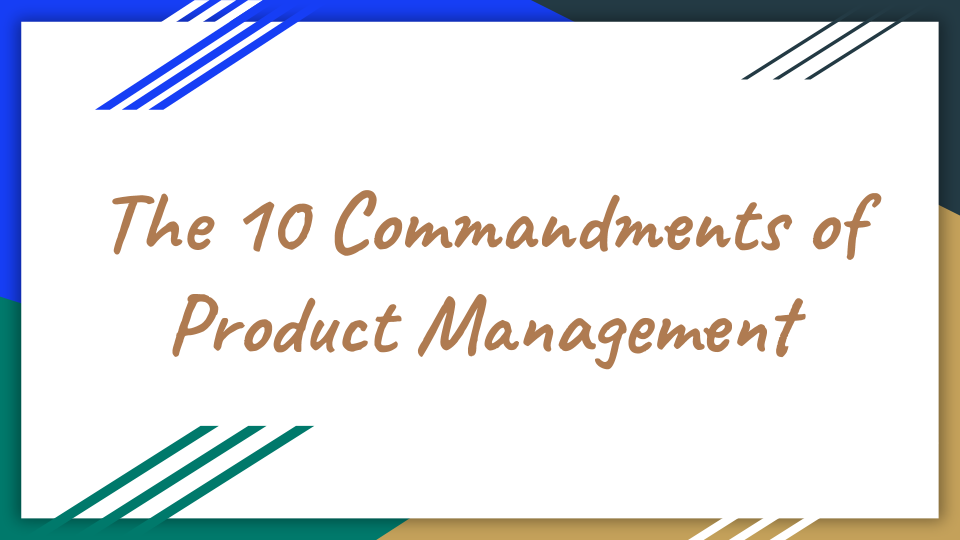
A thread of resources for aspiring & new Product Managers:
(should also be useful for Eng, Design, Data Science, Mktg, Ops folks who want to get better at PM work or want to build more empathy for your PM friends ☺️)
(oh, and pls also share *your* favorite resources below)
👇🏾
(should also be useful for Eng, Design, Data Science, Mktg, Ops folks who want to get better at PM work or want to build more empathy for your PM friends ☺️)
(oh, and pls also share *your* favorite resources below)
👇🏾
1/
Product Management - Start Here by @cagan
(hard to go wrong if you start with Marty Cagan’s work)
svpg.com/product-manage…
Product Management - Start Here by @cagan
(hard to go wrong if you start with Marty Cagan’s work)
svpg.com/product-manage…
2/
Tips for Breaking into PM by @sriramk
(I’ve recommended this thread in my DMs more often than any other thread, by a pretty wide margin)
Tips for Breaking into PM by @sriramk
(I’ve recommended this thread in my DMs more often than any other thread, by a pretty wide margin)
https://twitter.com/sriramk/status/1249860579994435585
3/
Top 100 Product Management Resources by @sachinrekhi
(well-categorized index so you can focus on whatever’s most useful right now)
sachinrekhi.com/top-resources-…
Top 100 Product Management Resources by @sachinrekhi
(well-categorized index so you can focus on whatever’s most useful right now)
sachinrekhi.com/top-resources-…
4/
Brief interruption.
It’s important to understand your preferred learning style and go all in on that learning style (vs. struggling / procrastinating as you force a non-preferred learning style)
Brief interruption.
It’s important to understand your preferred learning style and go all in on that learning style (vs. struggling / procrastinating as you force a non-preferred learning style)
https://twitter.com/shreyas/status/1294480873643839488
7/
Twitter is an invaluable resource for product people, much better than LinkedIn content.
Use it, and tell your PM friends to use it too.
But whom to follow?
Check out this list:
productschool.com/blog/product-m…
(fellow PMs, please reply below with other lists/accounts you like)
Twitter is an invaluable resource for product people, much better than LinkedIn content.
Use it, and tell your PM friends to use it too.
But whom to follow?
Check out this list:
productschool.com/blog/product-m…
(fellow PMs, please reply below with other lists/accounts you like)
8/
Consider following PM communities such as @TheProductfolks @womenpm
(fellow PMs, please do share more PM communities below)
Consider following PM communities such as @TheProductfolks @womenpm
(fellow PMs, please do share more PM communities below)
9/
Top 3 books for entry level PMs:
Inspired
Getting Things Done
The 7 Habits of Highly Effective People
Top 3 books for entry level PMs:
Inspired
Getting Things Done
The 7 Habits of Highly Effective People
https://twitter.com/shreyas/status/1318669357732409344
11/
I’m a fan of product/UI/strategy teardowns as a way to "learn-by-doing".
One teardowns resource I’ve recommended for a while is useronboard.com
There are a few out there (fellow PMs, please share more teardown resources below).
I’m a fan of product/UI/strategy teardowns as a way to "learn-by-doing".
One teardowns resource I’ve recommended for a while is useronboard.com
There are a few out there (fellow PMs, please share more teardown resources below).
12/
Lastly:
Be sure you want to be a PM. It’s a great role. I love it.
But PM isn’t the “step up” that ppl think it is.
There are other paths to success.
So choose it for the right reasons & be open to cutting your losses if you find out it isn’t for you
All the best!
❤️👍🏾
Lastly:
Be sure you want to be a PM. It’s a great role. I love it.
But PM isn’t the “step up” that ppl think it is.
There are other paths to success.
So choose it for the right reasons & be open to cutting your losses if you find out it isn’t for you
All the best!
❤️👍🏾
What other great resources did I miss?
Please reply to this tweet to share with the community.
🙏🏾
Please reply to this tweet to share with the community.
🙏🏾
Back to the top of this thread:
https://twitter.com/shreyas/status/1337999518017568770
Most of my regular content is for senior product folks & leaders, though I get a lot of pings from early career folks, so I'm glad folks are finding this thread useful.
Some really great resources being shared by others here. Do take a look at them.
A few additional footnotes:
Some really great resources being shared by others here. Do take a look at them.
A few additional footnotes:
Important to understand what Prod Mgmt is really. It isn't uncommon for people to spend years as a PM without understanding the essence of the role, what PM success looks like, and the main skills & mindsets. Better to understand these fundamentals early.
https://twitter.com/shreyas/status/1254064006412656640
If you prefer watching videos, you might like this talk with my journey as a PM & some lessons learned along the way:
A thread covering the necessary PM skills at each level
https://twitter.com/shreyas/status/1264621654015012866
This mega-thread is catered to aspiring PM leaders, but the 3 Essential Senses of a PM & the concept of 10-30-50 PMs is relevant for PMs at all stages. Start here to learn more:
https://twitter.com/shreyas/status/1055720052064833536
This is a pretty comprehensive guide on switching to PM, from @lennysan
lennyrachitsky.com/p/how-to-get-i…
lennyrachitsky.com/p/how-to-get-i…
• • •
Missing some Tweet in this thread? You can try to
force a refresh



